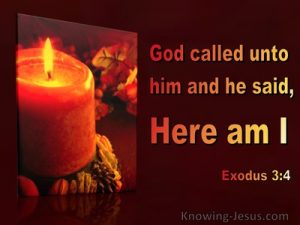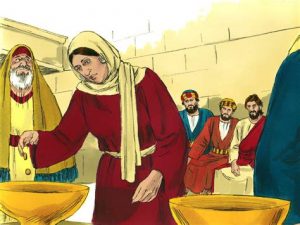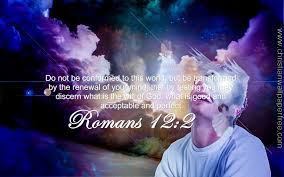
After reading a very intriguing book by Howard Blum, titled; “The Gold Of Exodus”, it’s about the search for the real Mt. Sinai. It’s a true story and it got my mind wanting to go back and dig deeper into the teaching and lessons we can learn from that epic journey Mose and the Israelites took across the desert. I pray this message that the Lord gave me while reading this book will help you grow in your walk with our Lord.
Exodus 3: 1-15
The Burning Bush
Now Moses was pasturing the flock of his father-in-law Jethro, the priest of Midian; and he led the flock to the west side of the wilderness and came to Horeb, the mountain of God. 2 Then the angel of the Lord appeared to him in a blazing fire from the midst of a bush, and he looked, and behold, the bush was burning with fire, yet the bush was not being consumed. 3 So Moses said, “I must turn aside and see this marvelous sight, why the bush is not burning up!” 4 When the Lord saw that he turned aside to look, God called to him from the midst of the bush and said, “Moses, Moses!” And he said, “Here I am.” 5 Then He said, “Do not come near here; remove your sandals from your feet, for the place on which you are standing is holy ground.” 6 And He said, “I am the God of your father—the God of Abraham, the God of Isaac, and the God of Jacob.” Then Moses hid his face, for he was afraid to look at God.
7 And the Lord said, “I have certainly seen the oppression of My people who are in Egypt and have heard their outcry because of their taskmasters, for I am aware of their sufferings. 8 So I have come down to rescue them from the power of the Egyptians, and to bring them up from that land to a good and spacious land, to a land flowing with milk and honey, to the place of the Canaanite, the Hittite, the Amorite, the Perizzite, the Hivite, and the Jebusite. 9 And now, behold, the cry of the sons of Israel has come to Me; furthermore, I have seen the oppression with which the Egyptians are oppressing them.
The Mission of Moses
10 And now come, and I will send you to Pharaoh, so that you may bring My people, the sons of Israel, out of Egypt.” 11 But Moses said to God, “Who am I, that I should go to Pharaoh, and that I should bring the sons of Israel out of Egypt?” 12 And He said, “Assuredly I will be with you, and this shall be the sign to you that it is I who have sent you: when you have brought the people out of Egypt, you shall worship God at this mountain.”
13 Then Moses said to God, “Behold, I am going to the sons of Israel, and I will say to them, ‘The God of your fathers has sent me to you.’ Now they may say to me, ‘What is His name?’ What shall I say to them?” 14 And God said to Moses, “AM WHO I AM”; and He said, “This is what you shall say to the sons of Israel: ‘AM has sent me to you.’” 15 God furthermore said to Moses, “This is what you shall say to the sons of Israel: ‘The Lord, the God of your fathers, the God of Abraham, the God of Isaac, and the God of Jacob, has sent me to you.’ This is My name forever, and this is the name for all generations to use to call upon Me.
J. B. Phillips in his book “Your God Is Too Small” tells of how he asked a group of young people to give a snap answer to the question, “Do you think God understands radar?” They all said no, and then they roared with laughter as they considered how foolish their answer was. It showed that in the back of their minds they thought of God as an old man who lived in the past and was rather bewildered by modern progress. Nothing is more pathetic than a mature person with an immature concept of God. Such an adult is seldom a dedicated Christian or an active servant of God. More than likely they reject God completely. They mature in all other areas of life, but in their concept of God, they remain childish. To make things worse, they think the rest of us are worshipping the God of their immature conception. They think we are quite simple and unacquainted with the hard facts of life.
These people have not rejected God, for they don’t even know Him. They have only rejected a god who doesn’t exist anyway except in their own mind. What these people need is the true biblical concept of God. This is what we all need, for our conception of God controls our attitudes and actions, and it determines the measure of our devotion to Him and His will.
Is your God just a spare time God you call upon only in emergencies?
You answer that by your commitment to Him. The person who gives his God only one hour a week of his life has a very small God and not the God of our Lord and Savior Jesus Christ.
One cannot stand in the pulpit and hand over to you an experience of the greatness of God any more than one can measure the horizon with a ruler. This can only come when a person says with Moses, “I will turn aside and see this great sight.” A man has to be willing to forsake his old concepts if he would grow in the knowledge of God as He really is.
When Martin Niemoller was in Hitler’s prison he had time to think, and he turned his thought toward God. He had to give up his old opinions about God. He wrote, “It took me a long time to learn that God is not the enemy of my enemies. He is not even the enemy of His enemies.” He had to give up the God he had created in his own image, and he came to see that God is love.
Moses needed to grow in his knowledge of God as well. God had prepared him to lead the children of Israel out of Egypt. The first 40 years of his life he gained the best education possible in all the wisdom of the Egyptians, but this knowledge was not enough for the task God had for him. He needed some good practical experience, and so God in His providence saw that he got it, and for the next 40 years, he was a shepherd in Midian where he learned the ways of desert life. He learned about the plants and animals, and about water sources and hardships. Now the second 40-year training period was over, and all Moses needed now was to meet God, and this he did at the burning bush, which is the Damascus Road experience of the Old Testament. We want to look at this experience and draw from it the 3 things which God does that enlarges our concept of Him.
I. HE DEMANDS REVERENCE. v. 4-5
You will notice that God appealed to the curiosity of Moses. Some people feel that faith and curiosity are contradictory, but this is not so. The impulse to inquire and learn is essential to a growing faith. God says, “Come now let us reason together,” and all of nature is a stimulus to an investigation. Curiosity is what made Watts ask why the lid on a boiling kettle bobbed up and down? His search for an answer led to the first workable steam engine. Curiosity is what made Sir Alexander Fleming investigate a mold, which led to the discovery of penicillin. Curiosity is what led Zaccheaus to climb a tree to see Jesus, which led to his conversion. It may have killed the cat but curiosity saved him and many others.
God wants people to investigate, but we see that when Moses came near He stopped him and tells him to take off his shoes. This was a sign of reverence and God demands that. If one is going gain from his search he must come in reverence and humility, for neither God nor His creation will reveal its secrets to the proud and irreverent. “Moses was led through the gates of curiosity into the sanctuary of reverence. Those who come to God or nature in pride to force the truth from them are courting disaster. You can count on it that those working with atomic energy are reverent before its power, and they are not careless and proud as if they needed no caution in its presence. To do so would be as foolish as for a Jewish person of old to stumble into the holy of holies. The great men of science such as Copernicus, Newton, Kepler, and Edison have been men of reverence in their inquiry. Edison said, “I sit down before the law. I try to find out how the law operates. I try to bring my mind and mechanisms into harmony with the way things are, and the more I obey the law, the more the law obeys me and serves my purpose.” Success in science comes through obedience just as success in the Christian life does. This is the only way to know God and His will. You must adjust to reality and not try to twist reality to your proud and preconceived notions.
A proud self-sufficient tourist went through one of Europe’s famous art galleries looking at many great masterpieces. As he was leaving he said to the custodian, “I don’t see anything so great about these paintings.” The custodian replied, “Sir, these pictures are not on trial, those who view them are.” So it is with Scripture, God, and His Word are not on trial, but you are. You must come in reverence seeking to know God if you expect to grow. The poet wrote Earth is crammed with heaven, And every common bush aflame with God, But only he who sees takes off his shoes. The rest sit around it and pluck blackberries.
II. HE PROMISES HIS PRESENCE. v. 11-12
Moses said, “Who am I?” Forty years before Moses felt he could handle things and he killed an Egyptian, but now he is more mature and humble. He wondered how a shepherd like him could walk into the palace of Pharaoh and persuade him to let hundreds of thousands of slaves go free. It can’t be done was his thinking, and he was right if he thought the success of the plan depended on his eloquence and ability to charm Pharaoh. Without the promise of God, “Certainly I will be with you,” Moses could not have succeeded. This is the case with the Apostles as well. Without the promise of Christ to be with them, they could not have succeeded. Nor can we, or anyone else, for we all need God’s presence to be successful. With His presence comes all the other promises. If God wills it then it can be done.
The poet has written, Never say it can’t be done, It simply isn’t true. What you mean my son is it can be done, But can’t be done by you. One of the greatest fallacies in the world is that one does not count. All of history proves it to be a lie, and yet we believe it. What can I do? Problems are too big for any one person to make a difference, and so I ignore the problem and become a part of the problem. It is true that you cannot do any more than Moses could on his own, but could we believe and claim the promise of God to be present with us, then we could say with Paul, “I can do all thing through Christ who strengthens me.” When David Livingston returned to Scotland after 16 years in Africa where he suffered 27 attacks of African fever, had one arm rendered useless by the bite of a lion, lived among a people whose language he did not know, and whose attitude toward him was often hostile, he said, “Shall I tell you what supported me through all these years of exile? It was this, ‘Lo I am with you always, even unto the end of the world.'”
There has never been a power that has been able to conquer people who live and believe in the presence of God. When Julian the Apostate was Emperor of the Roman Empire he did all he could to destroy churches and erect idols. Libanus, one of his friends, asked a Christian one day, “What is your Carpenter of Nazareth doing now?” The Christian responded, “He is making a coffin.” And soon Julian was in it and all the idols were swept away. In his dying breath, Julian cried out, “O Galilean! Thou hast conquered!” The early church believed that there has always been a success where there have been one or more persons who believe that God is with them and that through them God can accomplish His will. Moses said, “Who am I?” But that is beside the point said, God. It is not who you are but who is behind you and with you, that counts.
III. HE REVEALS HIS ESSENCE v. 13-15
To try and define God is to confine Him. Our minds cannot fully grasp His nature. This should not surprise us, for we cannot fully understand anything. The Psalmist cried out, “O Lord, thou hast searched me and known me. Thou understandeth my thought afar off.” But when he reverses the process and considers God he says, “Such knowledge is too wonderful for me, it is high, I cannot attain unto it.” This does not mean we must join those who think of God as a vague blur. We cannot find out by searching, but we can know who God is if he speaks to us and what he has done.
Paul constantly urges us to grow in the knowledge of God, and we can only do so by searching His revelation. Someone said, “We can never attain a maximum love of God with only a minimum knowledge of God.”
A virtuous godly man may be ignorant of many things, but his ignorance is not one of his virtues, nor is it the cause of his godliness. It would be strange if God could be loved better by being known less. What I am saying is that theology is not just for the theologian, but it is for all believers.
Imagine telling a man who is going to drive across a field and over a hill that he better watch out for the tree just over the hill, and he says, “Don’t talk to me about trees. I’m a motorist and not a botanist.” This is carrying specialization too far, for that tree is not only a fact of botany but a fact of life. Likewise, God is not just a fact of theology, but He is the greatest fact of life.
The first and most basic fact that God reveals here to Moses is that He is a Person and a God of persons. Those who know God only as He is revealed in nature come to think of Him as a power rather than a Person. They call Him the first cause, the unmoved mover, the cosmic organism, or the stream of tendency. It is easy to see how they arrive at this conclusion, for power is what nature reveals. A prominent physicist tells us that if we had to pay for the light bill from the sun at one penny per kilowatt, one-hundredth millionth part of a second would cost us more than World War II. Thank God he doesn’t charge for His power. The Bible tells us that this power has its source in a Person, and it goes further yet and even says He can be known as a Father. God is not a power that is unconcerned for us, but He is a Person whom we can know by faith in Jesus Christ. The Christian attitude to the wonders of the universe is in the words of the hymn, “This is my Father’s world.” All of reality should take on new meaning to one who knows God.
A mother rushed up the stairs as a thunderstorm broke loose thinking her little boy would be frantic with fear, but she found him at the window with his eyes bright with excitement. He was shouting loudly with every clap of thunder, “Bang it again God! Bang it again!” He had no fear of the power because he knew the Person behind the power.
The second thing God reveals about Himself is that He is the Eternal Present One. God never began, but always is. If He began then whatever caused His beginning would be greater than God. When the skeptic asks when did God begin, he is contradicting himself and does not realize it because of his false concept of God. He is asking when did that which had no beginning begin? God by very definition is without beginning. How far down is a bottomless pit?
Bottomless by very definition eliminates the possibility of giving any meaning to the question of how far down? How long is eternity? This is asking when does that end which by definition has no end. If you ask where was God before creation, you are asking where was God when there wasn’t anywhere, and where was God when there wasn’t any when. You might say that you don’t get it, and you are not alone, for eternity is just not part of our experience. About all, we can say about it is that it is not time, and we cannot think apart from time.
Eternity is ever-present, but in contrast, time is never present. You might say that it is right now, but that is not so for even in saying the word now you see the constant flow of time. By the time you say the w the end is already past, and when you finish the word the time you referred to is already gone. The present is so short, and so all of life is either in the past or the future, whereas in eternity all is present. The present is just the hole in the needle through which the thread of time passes for us, but for God, it is where He dwells beyond any of the limitations of time.
What God says to Moses implies many things about the nature of God. The important thing is that we begin to see that the God of Scripture is greater than any concept that man has. The gods that many atheists reject are puny concepts that have nothing to do with the God of Scripture. We do not believe in the gods most people reject either. They are often the product of man’s imagination and not God’s revelation. On the other hand, we do not believe in the many gods that others create in their own image. The god of the alcoholic is liquor and they are deeply devoted to their god. They love neither father nor mother more than it, and they will go to any length for it. There are many such gods that people are devoted to, but they are not the God revealed in Scripture through Jesus. He alone is worthy of our worship and devotion.
God taught Moses that He demands reverence, promises His presence, and reveals His essence to those who seek Him and obey Him. Your God is not big enough if He is not this God who revealed Himself to Moses and more completely through His Son Jesus Christ.
Until we get together again … Peace and remember … God’s love to you!
My prayer; 
Lord, thank you for standing by us and loving us through our sins. We ask you daily to forgive us and know your heart breaks for those who are lost. Show us how to do more for your kingdom and the strength and wisdom to do it.
In Jesus name, we pray,
AMEN















